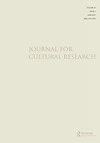Is coolness still cool?
IF 0.6
Q1 CULTURAL STUDIES
引用次数: 3
Abstract
ABSTRACT In the 1990s and early 2000s, “cool’ received substantial scholarly attention, some influential studies claiming that cool was becoming the dominant ethic in contemporary consumer societies, with increasingly global resonance. Yet it remains an elusive and complex phenomenon approached from numerous disciplinary islands, though sometimes curiously absent from studies of related phenomena such as fashion, ‘authenticity’, the ‘hipster’ and ‘low affect’. In the light of developments since the early 2000s (including apparently substantial changes to the form and content of coolness), I argue here for the continued relevance of cool and the need for re-evaluation of key ideas of the 1990s and 2000s. The paper briefly suggests why cool has proved so tricky to work with, before identifying five key themes in existing studies, highlighting some contradictions which invite further endeavour, perhaps focused on renewed attention to cool in relation to forms of modernity.凉爽还是凉爽吗?
在20世纪90年代和21世纪初,“酷”一词受到了大量学术关注,一些有影响力的研究声称,酷正在成为当代消费社会的主导伦理,并在全球引起越来越多的共鸣。然而,它仍然是一个难以捉摸的、复杂的现象,来自众多学科孤岛,尽管有时奇怪地没有在时尚、“真实性”、“潮人”和“低情感”等相关现象的研究中出现。鉴于21世纪初以来的发展(包括酷的形式和内容的明显实质性变化),我在这里主张酷的持续相关性,以及重新评估20世纪90年代和21世纪初的关键思想的必要性。在确定现有研究中的五个关键主题之前,本文简要地提出了为什么酷被证明是如此棘手的工作,强调了一些需要进一步努力的矛盾,也许集中在重新关注酷与现代性形式的关系。
本文章由计算机程序翻译,如有差异,请以英文原文为准。
求助全文
约1分钟内获得全文
求助全文
来源期刊

Journal for Cultural Research
CULTURAL STUDIES-
CiteScore
1.40
自引率
0.00%
发文量
23
期刊介绍:
JouJournal for Cultural Research is an international journal, based in Lancaster University"s Institute for Cultural Research. It is interested in essays concerned with the conjuncture between culture and the many domains and practices in relation to which it is usually defined, including, for example, media, politics, technology, economics, society, art and the sacred. Culture is no longer, if it ever was, singular. It denotes a shifting multiplicity of signifying practices and value systems that provide a potentially infinite resource of academic critique, investigation and ethnographic or market research into cultural difference, cultural autonomy, cultural emancipation and the cultural aspects of power.
 求助内容:
求助内容: 应助结果提醒方式:
应助结果提醒方式:


